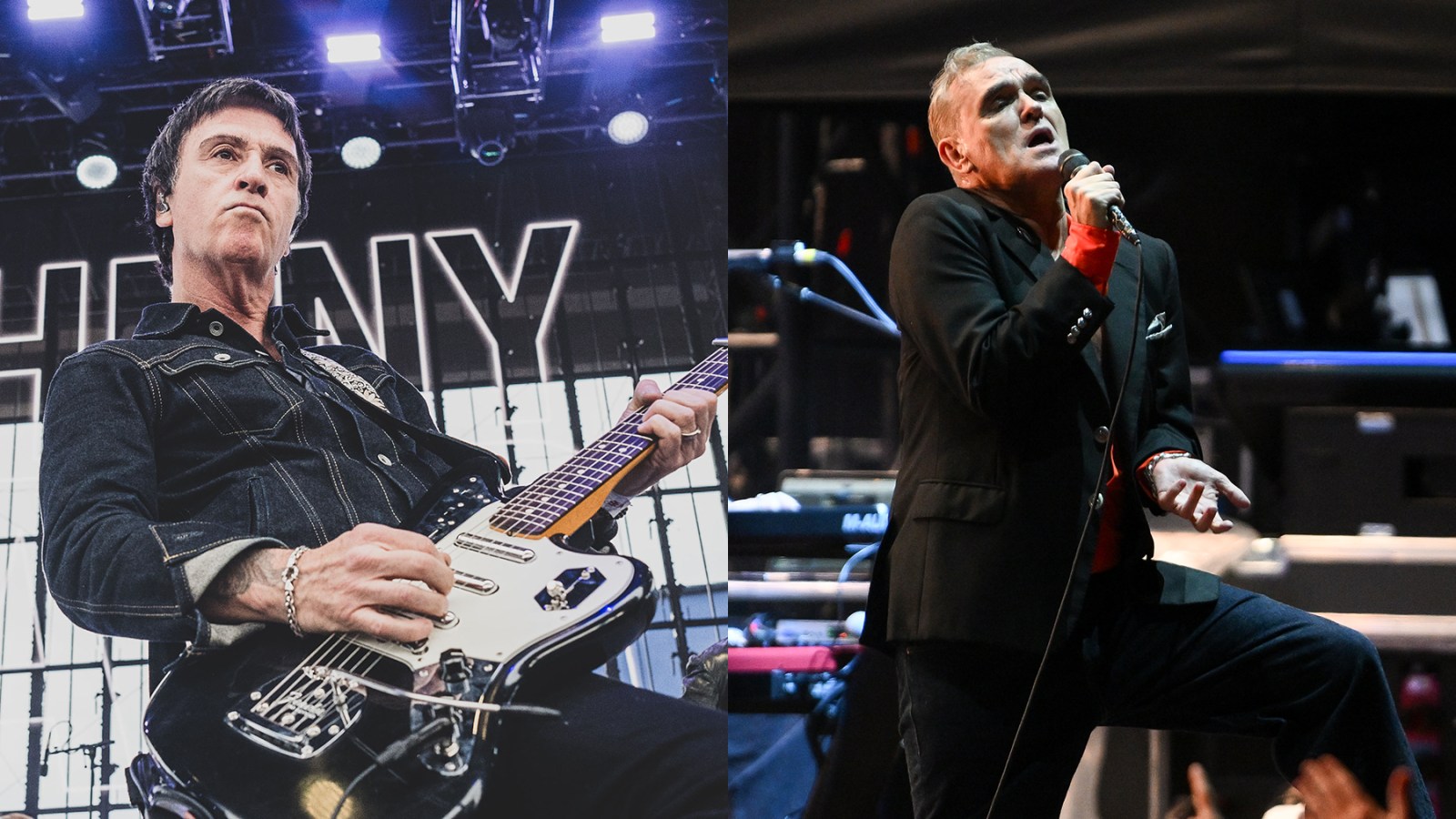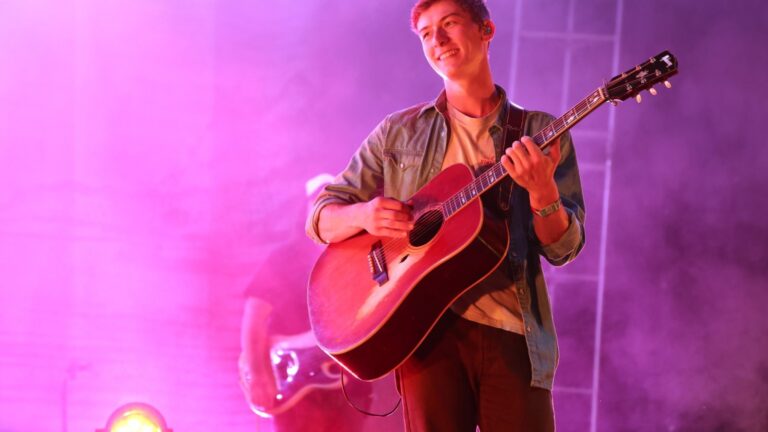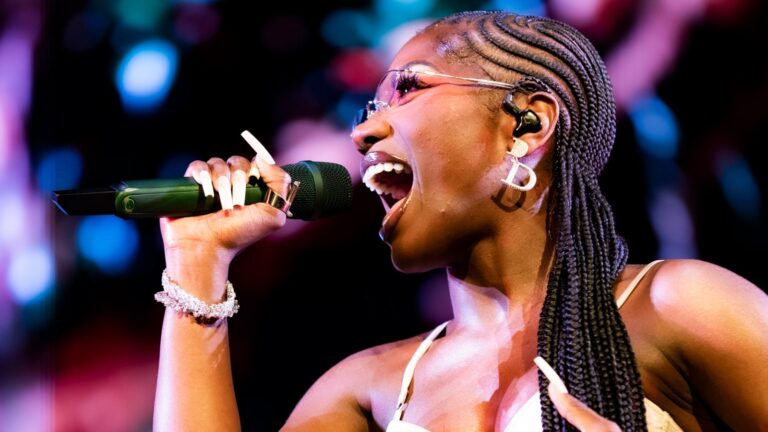It’s been over 38 years since Morrissey and Johnny Marr shared a concert stage. And despite the ludicrous sums of money they’d no doubt receive if they ever agreed to a Smiths reunion, it’s clear that’s simply never happening. But that doesn’t mean that Morrissey and Marr have turned their backs on the music they made during their brief partnership in the Eighties. They’re both on tour in the U.S. right now playing sets packed with Smiths classics — and I had the chance to witness both of their New York shows this month.
First up was Morrissey at Radio City Music Hall on Sept. 16. For much of his solo career, he’s sprinkled only a handful of Smiths songs into his live show. But this time around, six out of 18 songs were from the Smiths catalog: “There Is a Light That Never Goes Out,” “How Soon Is Now?,” “Half a Person,” “Shoplifters of the World Unite,” “I Know It’s Over,” and “Last Night I Dreamt That Somebody Loved Me.” At more recent shows, he’s added in “I Won’t Share You,” and upped the Smiths count to seven. (It would take a very deep dive into Setlist.FM to confirm, but I do believe that’s a record.)
“There Is a Light That Never Goes Out” is arguably the most cherished tune in the Smiths’ history. When Rob Sheffield ranked all 73 songs in the Smiths catalog, he placed it in the top spot. “Morrissey sings about not having a home, but generations of fans have found some kind of home in this song,” Sheffield wrote. “It’s all here – the passion, the pain, the pleasure, the privilege, the double-decker bus, the victory of love over death… ‘There Is a Light That Never Goes Out’ remains the ultimate tribute to the friendship behind it. Johnny Marr and Morrissey – two lonely Manchester kids who found each other and hatched a plan to go down in musical history, against all odds.”
Prior to the start of his tour on Sept. 10, Morrissey hadn’t played “There Is a Light That Never Goes Out” since 2017. In a major flex move, he opened the show at Radio City with it. He also walked out with a bouquet of flowers in his hands like this was a Smiths concert circa 1986. It sent a blast wave of nostalgia through the audience, and the performance was simply majestic. Morrissey’s divisive politics have turned away many fans in recent years, but they’re missing out if they stopped going to his shows. He’s in absolute peak form right now.
Eleven days later, I headed out to the CBGB Festival at Under the K Bridge Park in Greenpoint, Brooklyn. Johnny Marr played on the main stage before the Damned, Jack White, and Iggy Pop closed out the day. He was only given a 45-minute slot, and five of the nine songs were from the Smiths catalog: “Panic,” “This Charming Man,” “Please Please Let Me Get What I Want,” “How Soon Is Now?,” and “There Is a Light That Never Goes Out.” (That means his set was 55.5 percent Smiths. Morrissey’s Radio City show was 33.3 percent Smiths.)
Marr flipped the Morrissey script by closing with “There Is a Light That Never Goes Out” instead of opening with it. Much like the scene at Radio City, the crowd screamed along to every single word. But it didn’t have quite the same impact since it’s always a little to odd to see Marr sing Morrissey’s lyrics. The guitarist played an enormous role in the creation of every song in the Smiths catalog, but the emotion of the lyrics comes from Morrissey and his lived experiences.
When Marr sang, “So you go and you stand on your own/And you leave on your own/And you go home and you cry/And you want to die” during “How Soon Is Now?,” I just didn’t buy it. That’s a pure Morrissey sentiment. When Marr went to the club, he likely had a grand time and made new friends. It was Morrissey sulking in the corner and scribbling down the “How Soon Is Now?” lyrics.
I had the same feeling when Marr delivered “There Is a Light That Never Goes Out.” This is a man with one of the most enduring marriages in rock history. He met his wife Angie in 1979 when they were both teenagers, and they’re happily together to this day. He didn’t have a moment of “strange fear” in the darkened overpass where he found himself unable to express his real feelings. He spoke his mind, and won over the love of his life. (I also wasn’t convinced when Marr repeatedly sang “hang the DJ” during “Panic.” He was likely glad-handing with the DJ and cracking jokes. It was his songwriting partner that dreamed of killing him.)
From a pure financial perspective, it makes sense to remove Morrissey from theaters and Marr from afternoon festival slots and have them play these songs together at soccer stadiums. This is the conclusion that the fractured parties in Oasis and Guns N’ Roses came to in recent years. They may have not liked each other very much, but the pressure to reform, financial and otherwise, was simply impossible to resist forever.
There have been moments where Marr and Morrissey nearly succumbed to the pressure. In his 2016 memoir Set the Boy Free, Marr admitted that he sat down with Morrissey at a Manchester pub in 2008 to hash out their differences. It was their first encounter in a decade.
“Suddenly we were talking about the possibility of the band re-forming, and in that moment it seemed that with the right intention it could actually be done and might even be great,” Marr wrote. “I would still work with the Cribs on our album, and Morrissey also had an album due out…I was genuinely pleased to be back in touch with Morrissey. For four days it was a very real prospect. We would have to get someone new on drums, but if the Smiths wanted to re-form it would make a hell of a lot of people very happy, and with all our experience we might even be better than before.”
Needless to say, Morrissey changed his mind and the reunion never got beyond their chat in the pub. But an August 2024 a post on Morrissey’s official website revealed that AEG made a “lucrative offer” for Marr and Morrissey to reunite as the Smiths for a world tour. “Morrissey said yes to the offer; Marr ignored the offer,” reads the note. “Morrissey undertakes a largely sold-out tour of the USA in November. Marr continues to tour as a special guest to New Order.”
Marr usually ignores Morrissey’s online provocations, but he couldn’t stay quiet after this. “I didn’t ignore the offer,” he wrote. “I said no.”
The timing of this was deeply unfortunate since Smiths bassist Andy Rourke died just a little over a year earlier. He was one of Marr’s closest friends since childhood. In September 2022, they played “There Is a Light That Never Goes Out” together when Marr opened for the Killers at Madison Square Garden in New York.
If Morrissey had only acquiesced a couple of years earlier, it’s very possible Marr would have agreed, if only for Rourke’s benefit. But a partial reunion so soon after Rourke’s death was simply not going to happen. (Poor Mike Joyce is always the odd man out in these conversations. There are still very hurt feelings over the band’s legal battles in the 1990s, and Morrissey holds a grudge forever.)
The situation in Smiths Land is so dire at the moment that Morrissey recently proposed selling his share in the band. “I am burnt out by any and all connections to Marr, Rourke, Joyce,” he wrote. “I have had enough of malicious associations. With my entire life I have paid my rightful dues to these songs and these images. I would now like to live disassociated from those who wish me nothing but ill-will and destruction, and this is the only resolution.”
All of this adds up to a very odd situation where both parties are essentially saying, “I want nothing to do with the Smiths. Please stop asking me about them. I want to forever dissociate myself from the pain that band caused me and continues to cause me…AND I’m going to tour and perform a ton of Smiths songs every night.”
Oasis fans were given their happy ending earlier this year. Their older cousins in the Smiths camp will never experience that joy. But the music lives on in tours by two people who loathe each other. They created an incredibly bright light back in the 1980s, and it’ll never go out.



